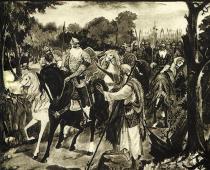
Shamans divide the world into three parts: Lower, Middle and Upper. That which is classified in psychology as the unconscious, shamans call the Lower World. As the well-known follower of Carl Jung, the psychoanalyst June Singer, wrote, “The miracle of the collective unconscious is that it has always been present in all the legends and history of the human race, with all its unexpelled demons and humble saints, with its secrets and its wisdom, and that it is one for each of us - a microcosm in the macrocosm. Exploring this world is much more difficult than exploring outer space.”
The classic ancient myth of Psyche and her lover Eros (Cupid) is often used to consider the development of a woman's consciousness. As such, the myth of Psyche is a wonderful illustration of the archetypal soul contracts that women face.
Psyche is the youngest and most attractive of the king's three daughters. Her beauty and tender soul are known throughout the kingdom, and the people begin to worship the mortal maiden as a deity. This provokes the wrath of Aphrodite, the goddess of love and beauty, and she plots against Psyche, scaring away all her admirers. When Psyche's father sees that not a single suitor appears on the threshold of their palace to ask for the girl's hand, he decides to turn to the oracle. But the oracle, under the influence of the jealous Aphrodite, announces that Psyche is destined to marry Death. In order for the prophecy to be fulfilled, Psyche's father chains his daughter to a rock, where she is to be taken away by the most terrible creature.
Psyche symbolizes the young and innocent part of our personality, which comes into conflict with the unchanging foundations that Aphrodite symbolizes. Psyche wants to love and be free, and Aphrodite wants the girl to bear the burden of previous generations of women. This is a universal myth of traumatized femininity, and this trauma is passed on from the old generation to the new.
Aphrodite, as an insidious avenger and teacher of life, went even further. Aphrodite sends her son Eros to Psyche, who must pierce the girl with one of his famous arrows of love in order to kindle her passion for Death. But Eros is so impressed by the beauty of Psyche that he forgets everything and falls in love with her. With the help of the wind, Eros carries the girl to the top of a distant mountain. This situation is very common in our real life. Some young girls run off with the first man who promises to free them from the tyranny of their parental home.
Despite all the ups and downs, the union of Eros and Psyche is happy. But Eros takes a promise from his beloved not to look at him in the light and not to ask him questions. This position is not too different from the position of many husbands who believe that their work schedule should not be discussed by their wives, and football or a bath on Saturdays is a priority than family activities.  For some time, this agreement does not bother Psyche - her nights are full of love, and during the days she eats exotic fruits and accepts signs of attention worthy of the goddess herself. But, unfortunately, this paradise is coming to an end. The role of the snake-tempter in this myth is played by the sisters of Psyche, who come to visit the girl in her luxurious mountain abode, become envious of her happiness and decide to destroy it. The sisters seek to plant doubts in Psyche's soul. (This does not remind you how our "friends, girlfriends, relatives ..." sometimes very skillfully, without malicious intent, but so ruthlessly instill in us doubt and distrust of a loved one.) They say that in fact Eros is terrible and ugly monster - otherwise why forbid him to look at himself? The sisters convince the gullible girl to get a lamp and a knife - the last one in case Eros, whose terrible secret will be revealed, wants to kill her. Psyche hides these items in her bedroom to light a lamp at night and see the true face of Eros.
For some time, this agreement does not bother Psyche - her nights are full of love, and during the days she eats exotic fruits and accepts signs of attention worthy of the goddess herself. But, unfortunately, this paradise is coming to an end. The role of the snake-tempter in this myth is played by the sisters of Psyche, who come to visit the girl in her luxurious mountain abode, become envious of her happiness and decide to destroy it. The sisters seek to plant doubts in Psyche's soul. (This does not remind you how our "friends, girlfriends, relatives ..." sometimes very skillfully, without malicious intent, but so ruthlessly instill in us doubt and distrust of a loved one.) They say that in fact Eros is terrible and ugly monster - otherwise why forbid him to look at himself? The sisters convince the gullible girl to get a lamp and a knife - the last one in case Eros, whose terrible secret will be revealed, wants to kill her. Psyche hides these items in her bedroom to light a lamp at night and see the true face of Eros.
One night, after the gentle caresses of Eros, she rises from her bed, takes a lamp and a knife and lights the light, illuminating the face of her sleeping husband. Shocked, Psyche sees not an ugly monster, but a beautiful god of love, the most beautiful creature in the world.
Seeing Eros for the first time in all the splendor of his beauty, Psyche is so shocked that she stumbles upon one of his arrows and falls in love with him. But at this time, she spills hot oil from the lamp on the shoulder of Eros. He wakes up and sees his beloved standing over him with a knife in her hand. Eros flees in fright and heads for his mother Aphrodite.
Psyche's heart is broken. She calls out to the gods, begging her to return Eros, but the gods do not want to go against Aphrodite. They unanimously say that only Aphrodite can help her. Psyche does not want to ask the jealous goddess, but at the same time she understands that she has no other choice. 
Look what happened, by this point Psyche had already experienced the loss of her soul twice. First, her father betrayed her (and did not protect her mother), and then her lover left her. The upcoming visit of Psyche to Aphrodite can be considered as a stage when a person tries to understand himself in order to find the source of his troubles and misfortunes. When Psyche comes to Aphrodite, she finds tasks that will allow her to say goodbye to the limiting image of herself as a sufferer and give her the opportunity to become strong and happy.
Aphrodite gives Psyche four incredibly difficult tasks, promising to return Eros if the girl copes with them. The fulfillment of these tasks is associated with such difficulties that Psyche is tempted at every step to drop everything and end her life. But at the same time, the girl firmly decides to rewrite her contracts of the soul.
She wants to find her true nature, because in the shining light of truth she has experienced true love.
The first task of Psyche is to sort through a huge pile of grains on pain of death and have time to finish the work by dawn. (It is not the task itself that is important, but the punishment for its failure, since we know that the life of our spirit depends on the fulfillment of our mission.) And then ants appear, which help Psyche sort through the grains.
The second task is to cross the river, reach the meadow where the evil golden-fleeced sheep graze, and pluck golden wool from them. The reeds that grow along the river advise Psyche not to approach the sheep, but to wait until dusk and collect the wool that gets stuck in the reeds. And when the girl copes with the second task, which seemed impossible, Aphrodite gives her an even more dangerous task: Psyche must fill the crystal goblet with water from the river of death Styx. This task seems completely impossible for the girl, and she is seriously considering putting her hands on herself. But then an eagle appears, which, clutching a goblet in its claws, flies to the river, collects water and brings it to Psyche.
The fourth task is the most difficult. Psyche must descend to the Lower World and ask the goddess Persephone for a jar of cream that bestows beauty, and bring it to Aphrodite. Psyche has absolutely no idea how she will go to the realm of the dead, but she receives advice from a mysterious tower towering above the earth, which symbolizes the Spirit. The all-seeing and all-knowing tower explains to the girl how to prepare for the upcoming journey, and gives detailed instructions.
The tower tells Psyche that the realm of the dead is guarded by Cerberus, an evil three-headed dog that guards the gates to the Underworld, allowing only the dead to enter. Behind these gates dwell hungry souls, suffering from salvation. Psyche must take with her two coins and two rye cakes, and also not help anyone who asks her for help.
All previous tasks were only preparation for this decisive test. She knows that she has allies ready to help her, and she understands that she is under the protection of the tower. And now she must descend to the Lower World - the very place where we go to find our lost souls - and find "her inner beauty, symbolized by the cream of Persephone.
On her way to the Lower World, Psyche first meets a lame man who is leading a miserable donkey loaded with brushwood. When several twigs fall to the ground, Psyche wants to bend down and pick them up in order to return them to their owner, but remembers in time that she is forbidden to help anyone. So Psyche continues on her way. She comes to the River Styx and gives Charon the ferryman one of the coins. When Charon transports her to the other side, Psyche sees a drowning man who begs her for help, but the girl refuses him. 
Having reached the shore, Psyche enters the world of the dead, where she meets three old women spinning the threads of fate. They ask her for help, but the girl again refuses and hurries on.
Psyche understands that nothing should stop her on the way to her goal. (In the same way, we can meet many lost souls on our journey to the Lower World, but we should stick to our goal.) Soon the girl meets Cerberus, who guards the gates to Hades, the underworld of shadows. Psyche tosses him one of the rye cakes and slips past while the three dog heads argue over who gets the treat.
Persephone happily shares her magic cream with Psyche, and the young woman begins her journey home. And then she is attacked by an irresistible desire to immediately look at the cream. But when she opens the jar, a dream descends on her - deep as death itself, and Psyche falls to the ground in a faint. (The fact is that gifts received in the Lower World cannot be opened - or deciphered - before returning to the Middle World. Otherwise, like Psyche, you may "sleep" or pass out and lose the true understanding of the meaning of gifts.)
Seeing his mortal love in danger, Eros comes to her aid. He wakes up Psyche and returns her to the world of people and gods. When Psyche brings Persephone's cream to Aphrodite, Eros asks his father Zeus for help. Zeus allows Psyche to drink from the stream of immortality. The girl becomes a goddess and is reunited with Eros as an equal with an equal.
This story teaches us that we can go an incredibly long way trying to act according to the terms of our soul contracts. When Eros saves Psyche from her marriage to Death, she agrees to whatever terms her savior puts forward. And really, what could be worse than the situation in which your own father gives you to be eaten by a terrible monster? Psyche enters into a contract under which she gives her love to Eros without even getting to know him properly, and this does not leave her the right to know who her lover really is. Psyche allows him to control every aspect of their relationship. In return, she gets the opportunity to live in paradise. How often women turn down the opportunity to show their strength and wisdom out of fear or unwillingness to upset their husband or relatives!
But whatever our paradise, we can only fulfill the conditions of the humiliating contract of the soul for a limited time. Sooner or later, we begin to realize that we are depriving ourselves. Just as Psyche cannot stop looking at Eros, our desire for self-knowledge brings us into conflict with the limitations of our soul contract. But like Psyche, who has to go through a series of severe trials, we can break our contract only with great effort. Like Psyche, we embark on a journey where we have to complete seemingly impossible tasks in order to discover what our true nature is.
Without rewriting the terms of our contracts, we live unconsciously. We constantly change partners in life in search of "Eros", which will save us, but over and over again we find ourselves in the same position. So, shocked by the loss of her husband, Psyche rushes to Aphrodite to make a new contract to "save the marriage" - instead of directly seeking the love of Eros. She accepts impossible tasks, because it seems to her that only Aphrodite is able to save her.
Why doesn't it occur to Psyche to simply invite the god of love to dinner? Once again, Psyche blindly believes in a person who, as she thinks, can solve her problems.
The story of Psyche also teaches us that courage and determination ultimately bring success. It is only after Psyche has crossed the River Styx (which symbolizes the last frontier in life) and risked her life that she finds the strength to refuse to help other people and gains the courage to defy the terms of her soul contract.
In order to change circumstances, you must first change yourself. When Psyche changes, the whole world changes with her. She leaves behind her mortal lot and finds a new destiny as a goddess.
Through the practice of spirit travel, we can renegotiate our soul contracts directly. We can review our lives by separating what we consider important and significant from what is not. In a similar way, Psyche went through the grains. We, too, can find golden wool to weave the fabric of new life and drink holy water before going to the Nether to restore our inner beauty and strength.
The first step to revisiting your soul contracts is to recognize that they exist. We don't have to wait for a crisis to start changing our contracts. We can revise them on more favorable terms for ourselves, without waiting for our world to turn into ruins. 
- In contact with 0
- Google+ 0
- OK 0
- Facebook 0








